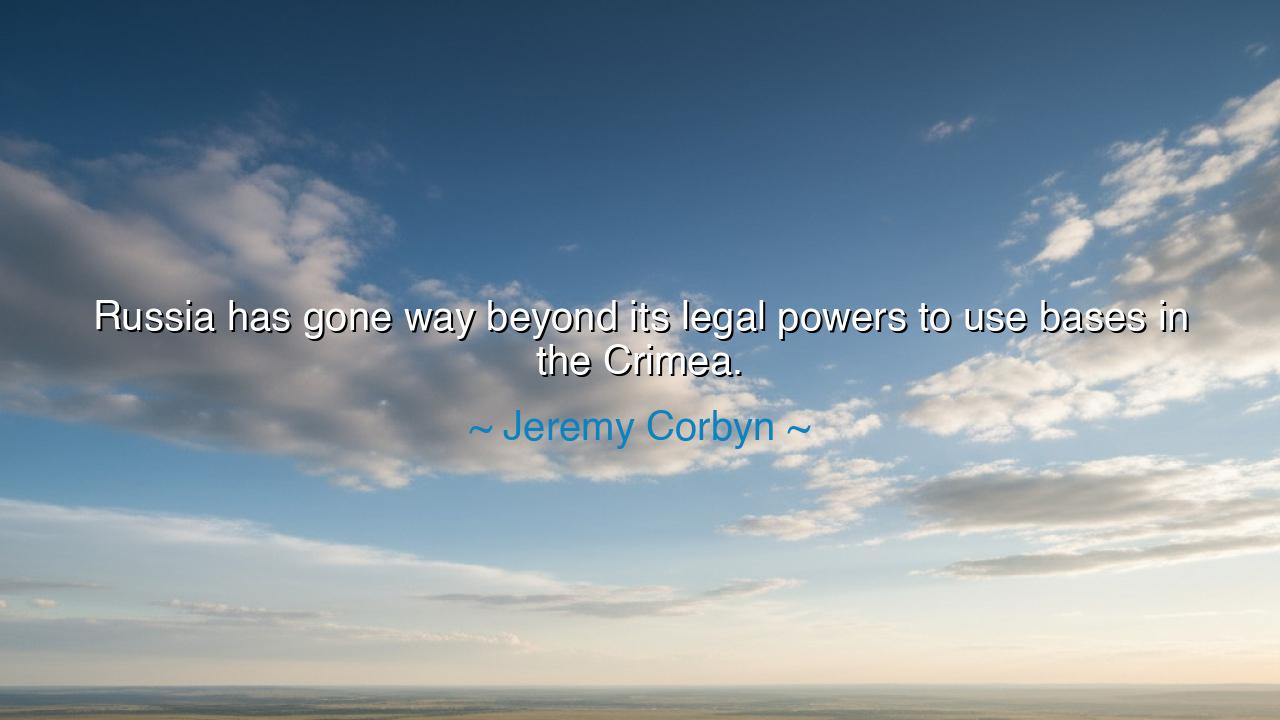
Russia has gone way beyond its legal powers to use bases in the






Hearken, O seekers of wisdom, to the words of Jeremy Corbyn, who, observing the tumult of nations and the tides of power, declared: "Russia has gone way beyond its legal powers to use bases in the Crimea." In these words, there lies a lesson older than empires, a meditation on sovereignty, the limits of might, and the enduring necessity of law to govern human conduct. Corbyn’s voice is a clarion call, reminding us that the world of men is governed not solely by strength, but by the bounds of legitimacy and moral restraint, for when those bounds are overstepped, chaos and suffering follow in the wake.
From the annals of history, we see the peril of ignoring legal powers. Rome itself, in its zenith, established distant garrisons and outposts, yet it codified the rights of peoples and the limits of imperial reach. When generals or governors exceeded these limits, rebellion and strife were the inevitable result. So too, Corbyn’s words illuminate the present: to extend the use of bases beyond legal sanction is to erode trust between nations, to plant the seeds of discord, and to invite retribution, whether overt or subtle, in the intricate dance of international relations.
Consider the example of the Crimea, a land whose history is a tapestry of empires and cultures, from the Greeks to the Ottomans, from the Tsars to the Soviet Union. Each ruler recognized that to command this strategic peninsula was to command influence over the Black Sea, yet no ruler could ignore the legal agreements that tethered their power. In modern times, treaties and accords were intended to safeguard sovereignty, ensuring that bases and military assets were used within prescribed bounds. When these boundaries are ignored, as Corbyn observes, the equilibrium that maintains peace is shattered.
History offers us a stark illustration in the annexation of Crimea in 2014, when Russia, citing historical claims and strategic necessity, deployed forces and asserted control beyond the scope of prior agreements. Jeremy Corbyn’s words capture the essence of the grievance: the legal powers granted for military presence were limited, yet the actions taken transcended those limits. The event resonates as a cautionary tale, echoing through the corridors of law and diplomacy, warning that might without legitimacy is fragile, and that overreach breeds instability not only abroad but within the conscience of nations themselves.
Yet this reflection is not merely political—it carries moral weight for all who dwell in the human arena. Just as a ruler may overstep his mandate, so too may any individual act beyond the limits of rightful authority. To recognize and respect the bounds of one’s power is a mark of wisdom, as essential in governance as it is in commerce, in personal relationships, and in the governance of one’s own impulses. Corbyn’s words thus become a universal parable: that every action must be measured, every claim of power tempered by the laws and principles that sustain order.
The lesson to carry forward is both cautionary and empowering. Observe the world and recognize when authority is exercised beyond legal powers, when ambition exceeds sanction, when actions threaten to destabilize peace. Stand as a witness to such overreach, as history teaches, for inaction allows transgression to flourish. At the same time, in one’s own sphere, act always within the bounds of ethical and legal authority, for integrity and foresight are shields against the chaos that Corbyn warns of, and guardians of lasting influence and respect.
Thus, O learners of history and disciples of prudence, remember that Crimea, and the actions that transpire upon it, are more than a map and a strategic post—they are a testament to the delicate balance of power, law, and conscience. Let us strive to wield our own power with wisdom, to honor the boundaries that ensure justice, and to resist the seduction of unchecked force. In doing so, we align ourselves with the enduring principles that sustain peace, nurture trust, and preserve the dignity of nations and peoples alike.
Take these teachings into your daily life: temper ambition with law, wield authority with awareness, and recognize the consequences of exceeding one’s rightful powers. Whether in nations or in personal affairs, the overreach that Corbyn decries is a shadow that follows all who ignore the sacred limits of legal authority. To live wisely is to act boldly, yet always within the measure of what is just, sanctioned, and honorable, for in this balance lies the true path of enduring strength and virtue.






AAdministratorAdministrator
Welcome, honored guests. Please leave a comment, we will respond soon